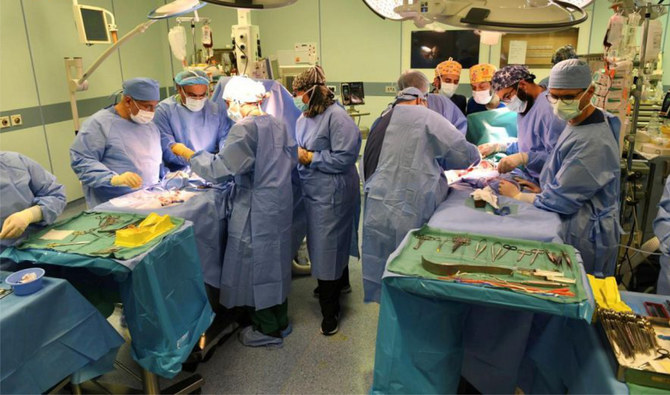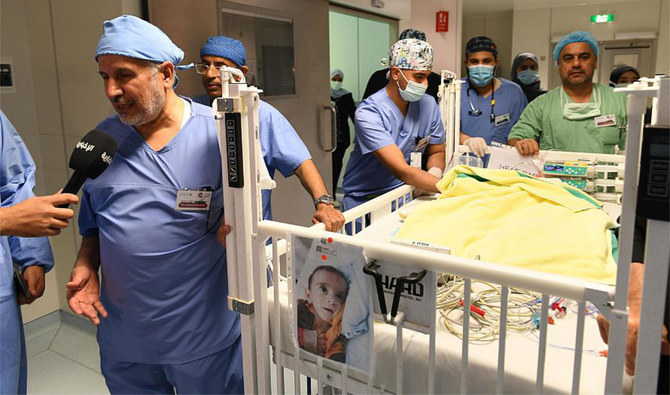RIYADH: A specialist team of surgeons completed surgery to separate Iraqi conjoined twins Ali and Omar in Riyadh on Thursday, the Saudi Press Agency reported.
The operation, which took 11 hours and consisted of six phases, was completed by a 27-member team of consultants, specialists, nursing and technical staff, and based on directives from King Salman and Crown Prince Mohammed bin Salman.
The team separated the twins, who were conjoined at the lower chest and abdomen, and shared a liver, bile ducts, and intestines.
Dr. Abdullah Al-Rabeeah, adviser at the Royal Court and supervisor general of the King Salman Humanitarian Aid and Relief Center, said that “this operation comes in implementation of the generous directives of the Saudi leadership,” making it the 54th such procedure of the Saudi Conjoined Twins Program.
Al-Rabeeah, who is also head of the medical team, added that the Saudi program had been able to operate on 127 conjoined twins from 23 countries during the past 32 years, and stressed the Kingdom’s pioneering role in humanitarian work in general and medical work in particular.
He thanked the medical team who performed the surgery for their efforts, and added that the achievement reflected the leadership’s willingness to help people.
He added that it was also an indication of Saudi medical excellence, and was in line with the goals of the Kingdom’s Vision 2030 to develop the country’s health sector and advance its quality and efficiency.
Abdul-Sattar Hadi Al-Janabi, Iraqi ambassador to the Kingdom, said he appreciated the unlimited humanitarian support and efforts provided by the Saudi government, and praised the efforts of the medical team led by Al-Rabeeah.
He also expressed his joy at the twins’ successful separation surgery.
Ali and Omar’s parents extended their thanks and gratitude to the king and crown prince for the surgery, and for providing their children with all necessary treatment.
Last week, the surgical team has also successfully separated Saudi conjoined twins who were attached at the hip and shared a spinal cord in an operation that lasted seven hours over seven stages.
The surgery, which was carried out under directives from King Salman and Crown Prince Mohammed bin Salman, required 28 consultants, specialists and nursing and technical personnel.
Earlier last month, Nigerian conjoined twins Hassana and Hussaina arrive in Saudi Arabia for a “delicate” separation procedure being carried out free of charge on the directives of King Salman.
Yahaya Lawal, Nigeria’s envoy to the Kingdom, said the monarch had sent a flying ambulance to transport the twins and their parents to Riyadh, where the surgery would take place.
The twins, born in hospital to a Nigerian couple, shared vital organs, including a liver.


















